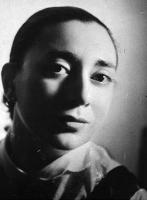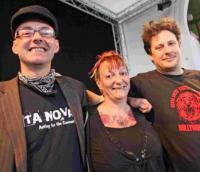August 7, 2012
Edited by David Sanders
Specimen Days
August 7, 2012
1533 – Alonso de Ercilla y Zúñiga, Basque soldier and poet (d. 1595), is born.
1826 – Carl AE Ahlqvist, [A Oksanen], Finnish poet (Suomalainen Runousoppi), is born.
1918 – Cees Buddingh’, Dutch poet/writer/interpreter, is born.
1921 – Alexander A Block, Russian poet (Dvenatsat), dies at 40
.
1941 – Radindranath Tagore, Indian philosopher/poet/writer, dies at 80.
1974 – Rosario Castellanos, Mexican poet (b. 1925), dies.
1995 – Tom Scott, poet/editor, dies at 77.
 Here I am, seated, with all my words,
Here I am, seated, with all my words,
like a basket of green fruit, intact.
The fragments
of a thousand destroyed ancient gods
seek and draw near each other in my blood. They long
to rebuild their statue.
—from “Silence Concerning an Ancient Stone” by Rosario Castellanos, 1925–1974
Poetry In The News
Contemplating the 35W Bridge Collapse Through Art and Poetry
 A public art installation in the Mississippi River seeks to inspire contemplation as Minnesotans mark the 5th anniversary of I-35W bridge collapse. “Project 35W”, which is up through the month of August, is the work of poet Todd Boss and Swedish visual artist Maja Spasova. It consists of 35 oversized life-rings anchored in the calmer river waters between the Stone Arch Bridge and the new I-35W Bridge. Read more at Minnesota Public Radio.
A public art installation in the Mississippi River seeks to inspire contemplation as Minnesotans mark the 5th anniversary of I-35W bridge collapse. “Project 35W”, which is up through the month of August, is the work of poet Todd Boss and Swedish visual artist Maja Spasova. It consists of 35 oversized life-rings anchored in the calmer river waters between the Stone Arch Bridge and the new I-35W Bridge. Read more at Minnesota Public Radio.
Cleveland’s Lake Effect Poetry Squad Taking Talents to the National Poetry Slam
Everyone knew the spots on the team were limited. A maximum of five people would be able to compete at nationals, so every second of the qualifying rounds counted. But after six months of competing, and years spent honing their craft, four Northeast Ohioans won their places.Their hands were tired. Their lungs ached. They’ll soon face 72 other teams that went through similar training periods: late nights spent practicing, perfecting their technique and taking a fair amount of constructive criticism. It will come to fruition next week, when they’ll be asked to leave it all on the field. Read more at Cleveland.com.
Homeless Poets from Bournemouth Perform Work at Royal Opera House
 HEART-wrenching tales of addiction and despair were performed at the Royal Opera House by Bournemouth poets. They took part in a special production for the London 2012 festival that was aimed at giving homeless and ex-homeless people a voice for the Olympics. “I am still blown away – it was a very powerful experience,” said Paul Hawkins, 48, of Springbourne, who read his work “Meet At The High Street Clock.” Read more at the Bournemouth Echo.
HEART-wrenching tales of addiction and despair were performed at the Royal Opera House by Bournemouth poets. They took part in a special production for the London 2012 festival that was aimed at giving homeless and ex-homeless people a voice for the Olympics. “I am still blown away – it was a very powerful experience,” said Paul Hawkins, 48, of Springbourne, who read his work “Meet At The High Street Clock.” Read more at the Bournemouth Echo.
World Poetry
Poet Turns Down Bakrie Award
The 80-year-old poet’s health suddenly deteriorated after he came from office in Lahore on Wednesday. He died on his way to the hospital. As a writer from the post-partition era, he was in literary circles with the likes of Nasir Qazmi and Ahmed Faraz. However, what distinguished him from other contemporaries was his extensive knowledge and command over various disciplines — poetry, philosophy, anthropology and psychology. Read more at the Express Tribune.
New Books
The Game of Boxes: Poems by Catherine Barnett
 [Paperback] Graywolf Press, 88 pp., $15.00
[Paperback] Graywolf Press, 88 pp., $15.00
In Catherine Barnett’s The Game of Boxes, love stutters its way in and out of both family and erotic bonds. Whittled down to song and fragments of story, these poems teeter at the edge of dread. A gang of unchaperoned children, grappling with blame and forgiveness, speak with tenderness and disdain about “the mothers” and “the fathers,” absent figures they seek in “the faces of clouds” and in the cars that pass by. Other poems investigate the force of maternal love and its at-times misguided ferocities. The final poem, a long sequence of nocturnes, eschews almost everything but the ghostly erotic. These are bodies at the edge of experience, watchful and defamiliarized.
Inferno: A New Translation by Mary Jo Bang
[Hardcover] Graywolf Press, 352 pp., $35.00
Award-winning poet Mary Jo Bang has translated the Inferno into English at a moment when popular culture is so prevalent that it has even taken Dante, author of the fourteenth century epic poem, The Divine Comedy, and turned him into an action-adventure video game hero. Dante, a master of innovation, wrote his poem in the vernacular, rather than in literary Latin. Bang has similarly created an idiomatically rich contemporary version that is accessible, musical, and audacious. She’s matched Dante’s own liberal use of allusion and literary borrowing by incorporating literary and cultural references familiar to contemporary readers: Shakespeare and Dickinson, Freud and South Park, Kierkegaard and Stephen Colbert.
Oppressive Light: Selected Poems by Robert Walser
 [Paperback] Black Lawrence Press, 200 pp., $19.00
[Paperback] Black Lawrence Press, 200 pp., $19.00
Oppressive Light: Selected Poems by Robert Walser represents the first collection of Robert Walser’s poetry in English translation and an opportunity to experience Walser as he saw himself at the beginning and at the end of his literary career––as a poet. The collection also includes notes on dates of composition, draft versions the printed poems represent, which volume of the Werkausgabe the poems were first published in, and brief biographical information on characters and locations that appear in the poems and may not be known to readers.
The Early Death of Men by Clint Margrave
[Paperback] NYQ Books, 96 pp., $14.95
In his dark and often humorous debut, The Early Death of Men, Clint Margrave gives us poems that provide no railings for the honest, frank edge on which they stand, poems that peek through telescopes and key holes in equal astonishment, devour words like stars devour planets, or lovers one another. Written in a language as accessible and sturdy as our bones, The Early Death of Men is humane, deliberate, and witty. An impactful, original, and fierce collection that despite its name promises to remain vital long after you put it down.
Recent Reviews
Book Review: Death of a Man by Marilyn Carr
by Joseph Yurt
Based solely on page count (38 pages), writer Marilyn Carr’s new book of poetry–actually, only a single poem is offered for the reader’s consideration–could be described as slight. And one could argue that the poem, “Death of a Man,” which is also the book’s title, is not poetry. Indeed, Carr challenges the reader on the matter in the book’s Foreword: “Have I written prose, poetry or just a little story? You decide. If you relate to this writing, whatever it is, hang tight because one day you will be written out of your sorrow.” Read more at Blog Critics.
How to Read a Prophecy
by Jennifer Chang
The potential for literature as prophecy emerges quietly, and quite powerfully, in Jen Bervin’s 2004 artist’s book or, depending how you read it, book of poems, Nets, which makes a stunning argument for paying more attention to both literary history and the materiality of writing. Bervin took The Complete Sonnets of William Shakespeare and proceeded to erase the text, emboldening a few selected words in each sonnet. Read more at the LA Review of Books.
Correspondences
Fanny Howe, 2012 Festival Poet
 by Martin Farawell
by Martin Farawell
Fanny Howe is part of a long line of poets who care deeply about exploring how and where the inner life intersects with the outer world. That inner life is spiritual, emotional, introspective and contemplative, and intimately interwoven with the vagaries of the ever changing world. Howe doesn’t rest on our common assumptions regarding the permanence of personality. Exploring the dynamic relationship between the endlessly evolving state of mind we often label “the self” and the ever-changing world it constantly interacts with is implicitly at the center of many of Howe’s poems. Read more at the Dodge Blog.
Broadsides
Percy Bysshe Shelley Frets About Information Overload . . . in 1821
 by Megan Garber
by Megan Garber
In 1821, Percy Bysshe Shelley — poet, dramatist, novelist, activist, critic — wrote a paragraph that would provide the introduction to 1840’s A Defence of Poetry. That essay, which would be published posthumously and which was not so much a defense of poetry as an unabashed celebration of it, found the lyricist creating a case for lyric as political art. Read more at The Atlantic.
Of Poetry and Motion
by Harry Eyres
In his poem “At Galway Races” W. B. Yeats laments the fact that poetry in the contemporary world cannot compete in popularity with sport. Read more at the Financial Times.
A Poet Unwelcome
 by Pnkaj Mishra
by Pnkaj Mishra
On April 12, 1924, Rabindranath Tagore arrived in Shanghai for a lecture tour of China arranged by Liang Qichao, China’s foremost modern intellectual. Soon after receiving the Nobel prize for literature in 1913, Tagore had become an international literary celebrity; he was also the lone voice from Asia in an intellectual milieu that was almost entirely dominated by Western institutions and individuals. As Lu Xun pointed out in 1927, “Let us see which are the mute nations. Can we hear the voice of Egypt? Can we hear the voice of Annam (modern-day Vietnam) and Korea? Except Tagore, what other voice of India can we hear?” Read more at Outlook India.
Drafts & Fragments
A Poet Contemplates the Aurora Shooting
by Zachary Barr
For a second time this summer, we turn to the state’s poet laureate under grim circumstances. Just last month, David Mason shared with us his poem about the Waldo Canyon fire in Colorado Springs. Mason lives there. He’s a professor at Colorado College. This time, he’s written about what he calls an “even more impossible subject,” the shooting in Aurora. Mason is spending some time in Oregon, so he recorded his poem, and some thoughts about it, himself. He tells us that, at first, it was hard to decide what approach to take. Read more at Brain Pickings.
Envoi: Editor’s Notes
100 Ways Poetry Is In Your Life
by Seth Abramson
I was out with a friend recently and he disclosed something troubling. He said that, as to poetry, he’d come to a point in his life in which he just couldn’t see the purpose of it anymore. Of poems specifically, or poetry generally. Writing it, reading it, thinking about it. Somewhere along the line the art had become tainted, for him, by certain of its manifestations, certain of its practitioners, certain of its communal practices. And while I wanted to console him — more than console; I wanted to grab him by the collar and shake him from his complacency — I found I had no words with which to do so, as I myself had not written a poem in some time, had become increasingly jaded about poets and poems and poetry and “poetries” and poetics. Read more at The Suburban Ecstasies.
It would be inelegant for me to comment much on this blog entry by Seth Abramson, whose generosity of spirit is reflected in his generosity of definition. While I’m not quite as expansive in my claims for poetry (on the darker days, it does seem petty consolation), I strive to be. Regardless, it’s worth reading Abramson’s remarks here, just as a rough gauge in our own depths of the pull and slack that poetry provides or has the potential to provide as we move through the days.
—David Sanders